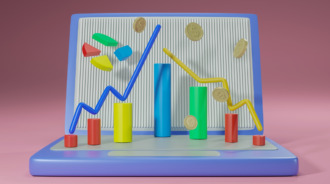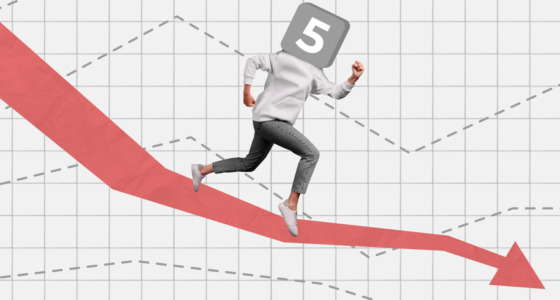

As a trader, you are always on the hunt for signals that can help determine the trend of a stock or the overall market. One pattern that is worth keeping an eye out for is the diamond bottom reversal pattern. This rare pattern forms at the bottom of a downtrend and indicates the potential for a reversal to the upside. When you spot this pattern forming, it may signal pessimism is fading and the bulls are ready to take control again.
The diamond bottom consists of a narrowing price range as the downtrend loses momentum. The volatility decreases, and the price forms a diamond-like shape. Once the price breaks out of the upper trendline of the diamond, it can be a sign that the reversal is confirmed. At this point, the price may start a new uptrend. The diamond bottom is uncommon, so when you detect this pattern, there is a good chance that other traders have not yet spotted it. This provides an opportunity to get in early on the reversal and enjoy strong gains as the new uptrend develops.
What Is the Diamond Bottom Pattern in Trading?
The diamond bottom pattern is a reversal pattern that forms at the bottom of a downtrend, signaling a potential reversal and uptrend. It is considered a rare but reliable pattern.
To identify the diamond bottom pattern, look for a narrowing shape over a period of time with a widening spread between the high and low points. The pattern forms because of temporary changes in trader sentiment. Initially, sellers are in control, pushing the price lower. Buyers then step in, stabilizing the decline. This results in a narrowing shape. When buyers overpower the sellers, the price breaks out upwards.
The diamond bottom pattern contains two reaction highs and two reaction lows. The first high and low points are far apart, the second high and low points are closer together, and the third set of high and low points are even closer. This forms the characteristic diamond shape. When the price moves above the upper reaction high, it confirms the pattern and signals a trend reversal.
To achieve trading results, look for a diamond bottom pattern that forms over 3 to 6 months. It should appear in a stock with high volatility and trading volume. Once confirmed, a price target can be calculated by measuring the pattern’s height and adding it to the breakout point. The diamond bottom is a reliable pattern, but as with any technical analysis, it should be used with other indicators to confirm the trend reversal.
How to Identify the Diamond Bottom Pattern
To identify the diamond bottom pattern, you need to look for a few key characteristics in the price chart of a stock.
Shape
The diamond bottom pattern forms the shape of a diamond or rhombus. Price action will slope downwards, then consolidate in a narrowing pattern before sloping upwards again. The top and bottom points of the diamond shape represent volatility contractions.
Four Points
Four pivotal points make up the diamond shape:
- The first point is the highest high before price action reverses into a downtrend.
- The second point is the lowest low reached at the bottom of the downtrend.
- The third point is the highest high during the consolidation or “squeeze”.
- The fourth point is when the stock breaks out above the third point, signaling a reversal of the downtrend.
Volume
As the diamond pattern forms, you will see volume decrease. This indicates decreasing interest in the stock as it declines. The volume will then increase substantially on the breakout, showing that a reversal is underway. This volume surge confirms the validity of the diamond bottom.
Trend Reversal
The diamond bottom pattern signifies a reversal from a downtrend to an uptrend. Once the price breaks above the upper resistance line of the diamond, it signals the previous downtrend has ended, and an uptrend may be starting. You should consider buying the stock.
With these characteristics identified, you can spot the diamond bottom pattern. When you do, it could indicate a prime opportunity to buy a stock at a discount, just as its trend reverses into a potential uptrend.
Trading Strategies for the Diamond Bottom Formation
Once a diamond bottom pattern has formed, there are a few trading strategies you can employ to take advantage of this bullish reversal signal.
Enter a Long Position
The most straightforward strategy is to enter a long position once the stock price closes above the upper trendline of the diamond bottom formation. This indicates the downtrend has reversed, and an uptrend may be beginning. You can enter a long position with a stop-loss order placed below the lower trendline of the diamond in case the reversal fails.
Use the Measured Move
The height of the diamond bottom pattern can be used to project an upside target for the new uptrend. Measure the distance from the upper trendline to the lower trendline. Then, add that distance to the breakout point where the stock closed above the upper trendline. This projected level is your upside target. You can take partial profits at this target and move your stop-loss to breakeven.
Look for Volume Confirmation
Watch for increased volume on the breakout bar and the bars immediately following. Heavy volume shows strong buying pressure and confirms the validity of the breakout. With light or declining volume, the breakout could be false, and the pattern may continue to develop into a more complex formation before the stock reverses course. Volume confirmation gives you more confidence to enter a long position.
Set a Stop-Loss
Always employ prudent money management and set a stop-loss order when trading a diamond bottom breakout. Place your stop a few percentage points below the lower trendline of the pattern or below key support levels. This will limit losses if the stock fails to follow through on the bullish reversal signal. Adjust your stop higher as the stock price rises to lock in profits.
Following these trading strategies can help you take advantage of the bullish diamond bottom reversal pattern and ride the new uptrend to significant gains. Be sure to also watch for additional signs of strength, like increasing volume and rising momentum, to add confirmation.

Examples of the Diamond Bottom Pattern
The diamond bottom pattern is a reversal pattern that forms at the bottom of a downtrend. It indicates a potential reversal in the trend and the start of an uptrend. Here are a few examples of the diamond bottom pattern:
Stock ABC
Stock ABC declined for several months, dropping from $25 to $10. At $10, the stock formed a diamond bottom pattern over the next few weeks. The diamond pattern consisted of two converging trendlines – an ascending support level and a descending resistance level. Once the price broke out above the resistance trendline at $12, it confirmed the reversal pattern. The stock proceeded to rally 50% over the following months.
Commodity XYZ
Commodity XYZ, a key industrial metal, declined for over a year, falling from $4.50/lb to $2/lb due to a global economic slowdown. At $2/lb, a diamond bottom pattern formed over 3 months as buyers and sellers negotiated a price bottom. When the price broke out above $2.25/lb, it validated the diamond reversal pattern. The price of XYZ then entered a steady uptrend, climbing over 100% within 9 months as industrial demand picked up.
The diamond bottom pattern represents a consolidation and battle between bulls and bears at a potential turning point. The breakout from the diamond pattern signals the bulls have succeeded, and a new uptrend may be starting. However, as with any pattern, there are no guarantees. It is important to wait for a clear breakout and look for other confirming signals like increasing volume, a reversal in momentum indicators, or a break of a long-term downtrend line. Combined, these factors improve the odds of a new sustainable uptrend emerging.
The diamond bottom is a versatile pattern found in stocks, commodities, forex, and other markets. With practice, traders can spot this powerful reversal signal and potentially capitalize on the new uptrends that emerge.
FAQ on the Diamond Bottom Pattern
The diamond bottom pattern can seem complicated, so here are some frequently asked questions to help clarify this ultimate reversal signal.
What exactly is the diamond bottom pattern?
The diamond bottom pattern is a reversal pattern that forms at the bottom of a downtrend. It indicates a potential trend reversal to the upside. It consists of a sharp V-shaped bottom, followed by a rally, then a wider V-shaped top, and then another rally. Together, these four points form the shape of a diamond.
How can I spot the diamond bottom pattern?
To spot the diamond bottom pattern, look for the following:
- A downtrend followed by a sharp spike lower (the first point of the diamond).
- A rally from the first point (the second point of the diamond).
- A wider spike lower (the third point of the diamond).
- Another rally from the third point (the fourth point of the diamond).
- The second and fourth points should be around the same level, forming the “diamond” shape.
What confirms the diamond bottom pattern?
The diamond bottom pattern is confirmed when the price breaks above the upper trendline (connecting points 2 and 4). This breakout signals that the downtrend has reversed, and the price may increase. Volume often increases substantially on the breakout for further confirmation.
How can I trade the diamond bottom pattern?
Once the diamond bottom pattern is confirmed, you can trade it in a few ways:
- Buy the breakout above the upper trendline.
- Place a stop-loss below the lower trendline.
- Set a price target by measuring the height of the diamond and projecting that above the upper trendline.
- Consider buying pullbacks to the upper trendline if the breakout continues higher.
The diamond bottom pattern is a powerful reversal signal. By knowing how to spot this pattern and act on confirmations, you can identify potential trend reversals and trade accordingly. Look for the diamond bottom in down-trending stocks, which may signal an emerging opportunity.
Conclusion
As you have seen, the diamond bottom pattern is one of the most reliable reversal signals in technical analysis. When the pattern completes and the price breaks above the upper trendline, it often indicates the end of the downtrend and the beginning of a new uptrend. By monitoring the markets you follow closely, you can watch for this pattern to form and then place buy orders as the price breaks out. The diamond bottom reversal can lead to strong moves higher, so being able to spot this pattern early and take a position can allow you to capture significant gains. Using proper risk management, the diamond bottom offers an opportunity to profit from a change in trend.










